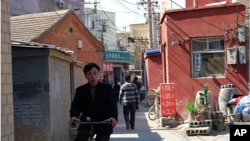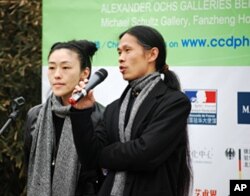A fight is brewing in the outskirts of Beijing. The argument pits artists against developers. As is often the case in China, where evicted residents around the country accuse developers and officials of colluding to make money by confiscating real estate, the conflict centers on what to do about a piece of land.
Caochangdi is a small village in Beijing's northeast corner, with a one square kilometer residential zone.
But the artists who live and work in Caochangdi say the area's cultural significance outweighs its size.
Internationally famous artist Ai Weiwei built the first studio there – the China Art Archives and Warehouse – in 1999. Since then, hundreds of artists and others in China's burgeoning art community have joined him in the area. The artists say they have contributed to the community by erecting tens of thousands of square meters of art galleries and studios, and adding thousands of diverse outsiders to the population mix in the village.
Their community, however, is in danger.
Photographer Rong Rong has lived in Caochangdi for nearly a decade. In 2007, he and his wife opened Three Shadows Gallery, Beijing's largest center for developing, displaying and archiving photographs.
Rong Rong says Caochangdi residents face what he describes as a bitter truth – the area has been claimed by local district authorities for redevelopment. He says the demolition date is not clear, but he anticipates it will be soon.
More than 40 art organizations recently signed an open letter calling on the authorities to reverse the decision to redevelop the area that includes Caochangdi. The letter calls the local government's decision "arbitrary, unreasonable and careless." It urges authorities to consider cultural development to be as valuable as economic development.
In recent years, Chinese art has shown it does have commercial value. Chinese artworks have attracted record prices at auction overseas, and are increasingly sought after internationally.
A local official, who spoke on background, acknowledged that Caochangdi has been incorporated into his office's redevelopment plan. He says the demolition company will decide when it will start tearing down buildings and that the information will be publicly announced.
Despite the threat of imminent destruction, Chinese artists banded together and went ahead with the first – and, they hope, not the last – Caochangdi PhotoSpring, a multi-gallery show that highlights photography from China and around the world. The Beijing show was organized in partnership with a 40-year-old photography festival that is held annually in the French city of Arles.
Frenchwoman Berenice Angremy is one of the PhotoSpring organizers. She runs Thinking Hands, a Beijing organization dedicated to promoting contemporary art. In 2004, she helped organize activities that are credited with protecting another area – Beijing's 798 Art District – from the wrecking ball.
"Beijing also has become a very international place for creation that everybody knows. And there are many art districts, many art studios, many institutions, devoted to contemporary art," Angremy says.
Over the past decade, as China's economy has expanded, tens of thousands of people have been forced from homes and businesses when local governments have seized land for redevelopment. Farms and city neighborhoods have been replaced by golf courses, factories, high-rise apartments and shopping malls.
Those kicked off the land often say they receive little compensation, and are forced to move far away from homes their families have occupied for generations. Commonly, there are complaints that local officials get rich off the redevelopment projects.
The issue has become politically sensitive, as angry residents increasingly protest to stop redevelopment.
Government officials often defend redevelopment projects by saying the new buildings provide more jobs and economic growth. They also say the old buildings are unsafe and overcrowded, and that redevelopment will improve an area's quality of life.
Photographer Rong Rong stresses that for many artists, making a better world is not always about making money.
He says the city is constantly expanding, and that these changes happen very quickly. In the midst of all of these rapid developments, he says, people should stop and reflect on the future. He urges everyone to consider the relationship between city growth and culture, and warns that if art communities are destroyed in pursuit of economic gain, it could damage the health of society.
Rong Rong is no stranger to a nomadic lifestyle. When the Fujian native came to Beijing decades ago, a series of redevelopment projects forced him to leave his living quarters on more than one occasion and move around town to find affordable housing. As development continues at a brisk pace in Beijing and around China, many others are likely to find themselves on the move.








